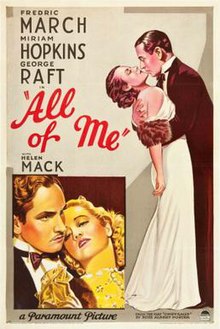
George Raft was an American film actor and dancer identified with portrayals of gangsters in crime melodramas of the 1930s and 1940s. A stylish leading man in dozens of movies, Raft is remembered for his gangster roles in Quick Millions (1931) with Spencer Tracy, Scarface (1932) with Paul Muni, Each Dawn I Die (1939) with James Cagney, Invisible Stripes (1939) with Humphrey Bogart, and Billy Wilder's comedy Some Like It Hot (1959) with Marilyn Monroe and Jack Lemmon; and as a dancer in Bolero (1934) with Carole Lombard and a truck driver in They Drive by Night (1940) with Ann Sheridan, Ida Lupino and Bogart.

Helen Mack was an American actress. She started her career as a child actress in silent films, moving to Broadway plays and touring one of the vaudeville circuits. Her greater success as an actress was as a leading lady in the 1930s. She made the transition to performing on radio and then into writing, directing, and producing shows during the Golden Age of Radio. She later wrote for Broadway, stage and television. Her career spanned the infancy of the motion picture industry, the beginnings of Broadway, the final days of vaudeville, the transition to sound movies, the Golden Age of Radio, and the rise of television.
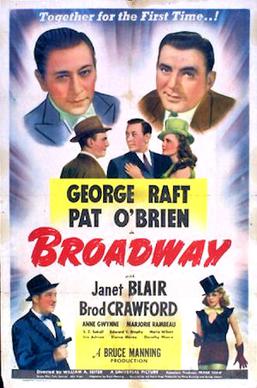
Broadway is a 1942 crime drama musical film directed by William A. Seiter and starring George Raft as himself and Pat O'Brien as a detective. The supporting cast features Janet Blair and Broderick Crawford.
Norman Krasna was an American screenwriter, playwright, producer, and film director who penned screwball comedies centered on a case of mistaken identity. Krasna directed three films during a forty-year career in Hollywood. He garnered four Academy Award screenwriting nominations, winning once for 1943's Princess O'Rourke, which he also directed. Krasna wrote a number of successful Broadway plays, including Dear Ruth and John Loves Mary.

Bolero is a 1934 American pre-Code musical drama film directed by Wesley Ruggles and starring George Raft and Carole Lombard. The Paramount production was a rare chance for Raft to play a dancer, which had been his profession in New York City, rather than portraying a gangster. The film takes its title from the Maurice Ravel composition Boléro (1928). The supporting cast includes William Frawley, Ray Milland and Sally Rand.
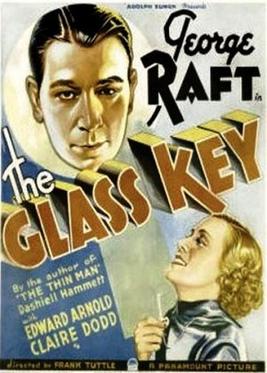
The Glass Key is a 1935 American crime drama film directed by Frank Tuttle starring George Raft, Edward Arnold, Claire Dodd, Guinn "Big Boy" Williams and Ray Milland. Ann Sheridan has a brief speaking role as Raft's character's nurse in their first film together. Produced and distributed by Paramount Pictures, it was based upon the 1931 suspense novel The Glass Key by Dashiell Hammett,
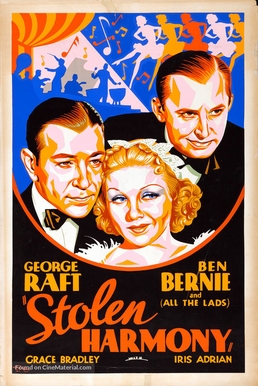
Stolen Harmony is a 1935 American crime film directed by Alfred L. Werker and starring George Raft, Ben Bernie and Grace Bradley. It is a semi-musical, featuring Big Band numbers. It was produced and distributed by Paramount Pictures.

The Trumpet Blows is a 1934 American Pre-Code film directed by Stephen Roberts, featuring George Raft as a Mexican matador, Adolphe Menjou as a retired bandito clearly based on Pancho Villa, and Frances Drake as Chulita, the woman they both want to marry.

You and Me is a 1938 American crime drama/comedy/romance film directed by Fritz Lang. It stars Sylvia Sidney and George Raft as a pair of ex-convicts on parole, working in a department store whose owner, played by Harry Carey, routinely hires former criminals to give them a second chance. It was written by Norman Krasna and Virginia Van Upp.
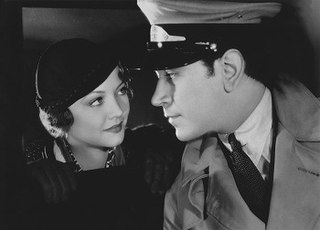
Pick-Up is a 1933 American pre-Code crime film directed by Marion Gering and starring Sylvia Sidney and George Raft.

Dancers in the Dark is a 1932 American pre-Code film about a taxi dancer, a big band leader, and a gangster.

Madame Racketeer is a 1932 American pre-Code comedy film featuring Alison Skipworth, Richard Bennett and George Raft. The movie was directed by Harry Wagstaff Gribble and Alexander Hall. It was produced and distributed by Paramount Pictures.

Under Cover Man is a 1932 American pre-Code crime film directed by James Flood and starring George Raft, Nancy Carroll and Lew Cody. It was produced and distributed by Paramount Pictures.

Rumba is a 1935 American musical drama film starring George Raft as a Cuban dancer and Carole Lombard as a Manhattan socialite. The movie was directed by Marion Gering and is considered an unsuccessful follow-up to Raft and Lombard's smash hit Bolero the previous year.

The Story of Temple Drake is a 1933 American pre-Code drama film directed by Stephen Roberts and starring Miriam Hopkins and Jack La Rue. It tells the story of Temple Drake, a reckless woman in the American South who falls into the hands of a brutal gangster and rapist. It was adapted from the highly controversial 1931 novel Sanctuary by William Faulkner. Though some of the more salacious elements of the source novel were not included, the film was still considered so indecent that it helped give rise to the strict enforcement of the Hays Code.

Design for Living is a 1933 American pre-Code romantic comedy film directed by Ernst Lubitsch from a screenplay by Ben Hecht, based on the 1932 play of the same name by Noël Coward. Starring Fredric March, Gary Cooper, and Miriam Hopkins, the film is about a woman who cannot decide between two men who love her, and the trio agree to try living together in a platonic friendly relationship.
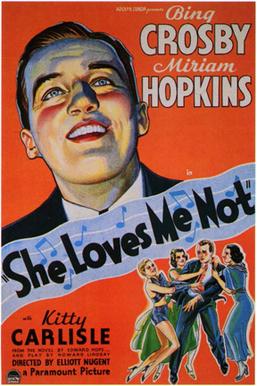
She Loves Me Not is a 1934 American comedy film directed by Elliott Nugent and starring Bing Crosby and Miriam Hopkins. Based on the novel She Loves Me Not by Edward Hope and the subsequent play by Howard Lindsay, the film is about a cabaret dancer who witnesses a murder and is forced to hide from gangsters by disguising herself as a male Princeton student. Distributed by Paramount Pictures, the film has been remade twice as True to the Army (1942) and as How to Be Very, Very Popular in (1955), the latter starring Betty Grable.

Outpost in Morocco is a 1949 American action adventure film directed by Robert Florey, starring George Raft and Marie Windsor. Paul Gerard (Raft), a Moroccan Spahi officer and his French Foreign Legion garrison, holds off attacks from the native tribes of the Emir of Bel-Rashad, the father of Cara (Windsor), the woman he loves. As a rarity amongst American films of the Foreign Legion genre, the Legion cooperated with the producers. A second unit led by Robert Rossen filmed scenes in Morocco. Some of the large-scale action scenes of the film were reused in Fort Algiers and Legion of the Doomed.
College Rhythm is a 1934 American musical comedy film directed by Norman Taurog and starring Jack Oakie, Mary Brian, and Joe Penner.

Adrian Michael Morris was an American actor of stage and film, and a younger brother of Chester Morris.
